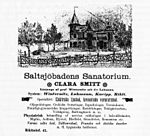Clara Emilia Smitt
Clara Emilia Smitt | |
|---|---|
 Smitt in the 1890s | |
| Born | 4 January 1864 Stockholm, Sweden |
| Died | 13 January 1928 (aged 64) Stockholm, Sweden |
| Occupation(s) | Doctor, author |
Clara Emilia Smitt, (4 January 1864 – 13 January 1928) was a Swedish doctor and author.[1] Between 1896 and 1902 she ran Saltsjöbadens sanatorium in Saltsjöbaden.[2]
Early life and education

Born in Stockholm, Clara Smitt grew up as a foster child to Clara Josefina Gustafsson who worked as a maid, and by 1890 she was registered as a student.[3] She trained as a nurse and graduated from her class in 1892.[4] In 1895, she moved to the recently built Saltsjöbaden in Nacka, where on 1 May she opened Saltsjöbadens sanatorium in a villa also called Malmska Villan.[5] She was later a nurse working during the Greco-Turkish War in 1897 and was in 1899 awarded a Red Cross medal in memory of her work during the war.[6] She received the award from the Greek queen.[6]
Clara Smitt had passed the exam for hydrotherapy and received further training from the Austrian doctor Wilhelm Winternitz. She also studied medicine abroad, where she became interested in modern health methods including water and light therapy.[7] She wanted to use her knowledge in Sweden, believing that diseases and sickness could be cured not only by medicines, but by healthy living such as diets, exercise and baths in different forms.[8]
Career
She was also one of Sweden's earliest women rights activists and wrote articles on the subject for the magazine Idun .[9][10][11] And in 1897 she published a book called Kvinnans ställning i samhället: några inlägg i nutidens sociala spörsmål (Women's position in society: a few notes about contemporary social questions).[4] In 1898 she published Helios, a magazine for spiritual and material well being which was released for seven editions.[12] In 1898, she married Erland Dryselius and afterwards changed her name to Clara Smitt-Dryselius.[13]

Economic hardship caused her to end her work at Saltsjöbaden in 1902.[14] In December that year the couple moved to Vingåker in Södermanland County where they started running a water health spa called Byle-Wörishofen.[15] By 1903, she also had started the light therapy institute Helios at Riddargatan in Stockholm.[16] In 1911, she announced in the magazine Dagny that she was a bath/swimming doctor for the Electric Light Institute.[15] By 1918, she was running a massage and light clinic at Råsunda.[17] She died on 13 January 1928 and was buried on 20 January 1928.[16]
References
- ^ Sveriges dödbok 1901–2013, (Version 6.0) Sveriges släktforskarförbund (2014) ISBN 9187676648
- ^ "Jag har hittat Runa men utan ledtrådar..." iFokus. Retrieved 20 February 2016.
- ^ Nacka kommun, registreringsbok , p 120.
- ^ a b "LIBRIS – Kvinnans ställning i sämhälle..." Retrieved 20 February 2016.
- ^ Nacka kommun, registreringsbok, p 95.
- ^ a b Kvinnohistoria – Clara Emilia Smitt
- ^ Nacka kommun, registreringsbok, p 165.
- ^ Nacka kommun, mediabank "Malmska villan", p 230.
- ^ "Feminism". Studentlitteratur.
- ^ "Göteborgs universitetsbibliotek: Idun 1888". Retrieved 7 March 2016.
- ^ Idun, 23 July 1896 edition, page 12.
- ^ Litteratur – Clara Emilia Smitt Archived 2015-12-08 at the Wayback Machine Retrieved 20 February 2016
- ^ "Erland Dryselius". Retrieved 20 February 2016.
- ^ "Stockholms läns museum – Visa". Archived from the original on 8 December 2015. Retrieved 20 February 2016.
{{cite web}}: Unknown parameter|deadurl=ignored (|url-status=suggested) (help) - ^ a b "Bad Wörishofen Karta och Väder". Retrieved 20 February 2016.
- ^ a b "Norra begravningsplatsen, kvarter 10A, gravnummer 342". Archived from the original on 11 December 2015. Retrieved 20 February 2016.
{{cite web}}: Unknown parameter|dead-url=ignored (|url-status=suggested) (help) - ^ Stockholmskällans adressböcker för år 1903, 1910 och 1918.
